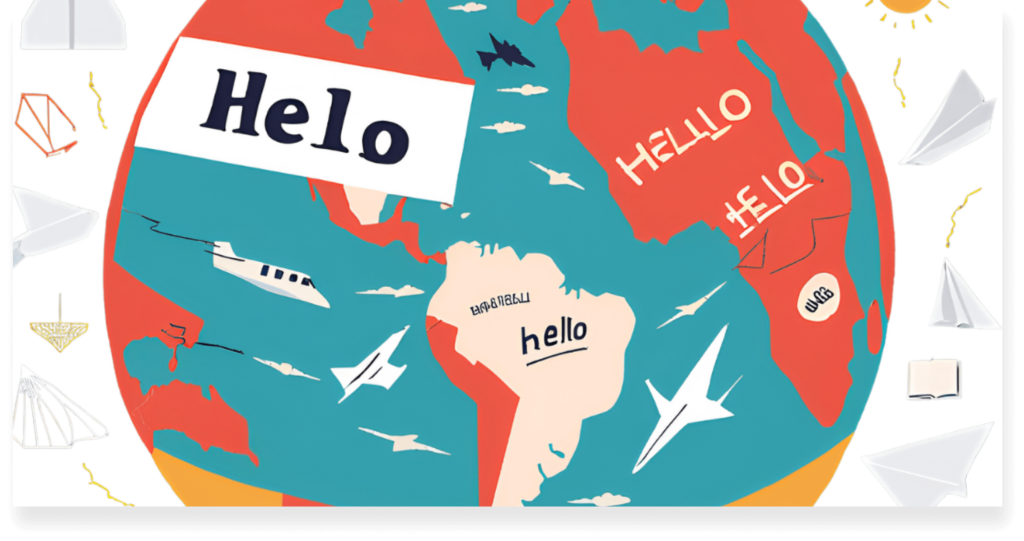
Alex E. |
August 29, 2024
In the grand airport of global communication, some words and phrases possess a special kind of passport. They effortlessly cross language barriers, maintaining their essence wherever they land. Take “hello,” for instance. Whether it’s “hello” in English, “안녕하세요” (annyeonghasaeyo) in Korean, “bonjour” in French, “hola” in Spanish, or “Здравствуйте” (Zdravstvuyte) in Russian, the core meaning of a greeting remains clear. It’s as if these linguistic travelers have mastered the art of packing light, carrying only their core meaning across borders.
However, not all words and ideas are such seasoned globetrotters. This border is where Localization Quality Assurance (LQA) steps in, acting as a skilled travel agent for language. LQA ensures that when messages cross borders, they don’t just translate—they genuinely communicate.
A common misconception about localization is that it merely involves translation at face value. Many don’t initially grasp the extent of cultural adaptation required, including adjustments for idioms, imagery, and local impact, leading to underestimating the complexity and expertise involved in the process.
Here’s a true story: In an old project, a tourist accommodation’s promotional material nearly invited guests to an unexpected “car culture experience” instead of the intended “tea culture experience.” The culprit? The Korean word “차” (cha), which can mean both “tea” and “car.” This small but significant mix-up illustrates how even common words can lead to amusing—at times, mortifying—misunderstandings in localization, highlighting the importance of context in our work. Thankfully, sharp-eyed LQA professionals caught the issue before it reached the public.

LQA professionals are like linguistic customs officers, not just checking if words have the right “papers” to enter a new language but also ensuring that humor, expressions, or cultural nuances translate effectively. Without this careful inspection, we risk more than just awkward phrasing. We could face severe turbulence in the form of confused customers, damaged reputations, or unachieved goals.
The process of giving words and ideas their “linguistic passport” is driven by human expertise and enhanced by technology. Native-speaking linguists, fluent in several languages, form the core of this process. These experts ensure that messages not only translate accurately but also resonate culturally.
To keep linguistic travelers on track, organizations develop comprehensive style guides and glossaries for each target language. Regular training keeps language agents updated on the latest cultural trends and local customs. Open communication channels also ensure that any word or phrase lost in transit is quickly found and rerouted.
Furthermore, working alongside linguists are seasoned editors who double as language process engineers and post-editors. They bring a technical perspective to linguistic challenges, bridging the gap between pure linguistics and the technical demands of modern content localization.
Technology plays a crucial role in the current era of globalization. Translation memory tools and terminology databases help maintain consistency across large-scale projects. Artificial intelligence (AI) has also joined the party, offering machine translations that, when combined with human post-editing, can help ideas travel faster and more accurately than ever before.
Once, a confusing legal translation posed a significant challenge. Using AI for assistance, a language model analyzed both the original text and the poorly executed translation, filling in gaps and clearing up confusion. This method allowed the AI to function like a smart assistant, catching any missed details. The experience revealed how AI can significantly assist in fixing even the most demanding translation and editing problems, making the localization process faster and more accurate. As such, this blend of human expertise and AI capabilities opens endless possibilities in the field of localization and quality assurance (QA).
It is fascinating how the synergy between native-speaking linguists, editors, and AI creates a robust LQA process. This combination of deep cultural knowledge, technical expertise, and cutting-edge technology enables swift, accurate, and culturally sensitive translations.
“As our world becomes increasingly interconnected, mastering this art of linguistic travel agency is essential. By combining human expertise with cutting-edge technology, we can ensure that ideas don’t just cross borders; they are warmly welcomed wherever they land.”
Ultimately, great LQA is about more than just translating words and ensuring they are grammatically sound; it’s about issuing passports to ideas, allowing them to travel freely and connect with people across the globe. In this world of linguistic jet-setters, LQA isn’t just a service—it is the key to unlocking fundamental global conversations.